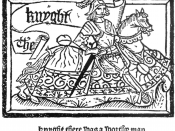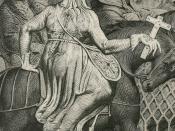Perhaps one of the most complex characters in Geoffrey Chaucer's Canterbury Tales, the Pardoner is a challenge to analyze as his multi- layered presentation in the text can lead to various interpretations. The pardoner is a manifestation of several themes that recur throughout the short story, most notable the hypocrisy of the Christian church. This paper will explore intentional and unintentional self-characterization as seen in his prologue and tale. It should be noted that Chaucer is the author recounting the Canterbury Tales in the role of a pilgrim retelling the story of the pilgrimage; it is impossible to determine what the intended to reveal about himself versus what was a kept as a deliberate secret.
The General Prologue of the Canterbury Tales paints somewhat of a negative portrait of the Pardoner. First, Chaucer associates him with the lower class, following with a physical description that highlights effeminate attributes. The imagery noted creates a negative atmosphere, and in medieval context a flawed physical appearance suggests a flawed morality.
The narrator confirms that the Pardoner is the best in his profession; he sheds doubt on the authenticity of the Pardoner's artifacts.
One of the many themes interwoven throughout the Canterbury Tales is the discrepancy between the ideals that a religious figure should represent. The pardoner depicts a corrupt religious figure. Despite the question concerning his Christian authority, the pardoner freely admits his imperfection, yet claims to do good for others.
The Pardoner's tale begins with him speaking against drunkenness and the avarice, calling on the examples of Lot, Herod and Seneca, etc... to show that the consumption of alcohol leads to sin. Other contradictions surface when the Pardoner compares his sermons to his deeds: he addresses his audience the same way each time by saying radix malorum est cupiditas("money is the...


